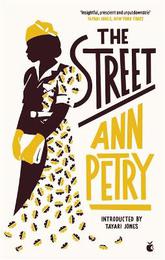
|
The Street
Paperback / softback
Main Details
| Title |
The Street
|
| Authors and Contributors |
By (author) Ann Petry
|
| Series | Virago Modern Classics |
|---|
| Physical Properties |
| Format:Paperback / softback | | Pages:416 | | Dimensions(mm): Height 196,Width 126 |
|
| Category/Genre | Modern and contemporary fiction (post c 1945) |
|---|
| ISBN/Barcode |
9780349012933
|
| Classifications | Dewey:813.54 |
|---|
| Audience | |
|---|
|
Publishing Details |
| Publisher |
Little, Brown Book Group
|
| Imprint |
Virago Press Ltd
|
| Publication Date |
17 December 2019 |
| Publication Country |
United Kingdom
|
Description
With a new introduction by TAYARI JONES, author of An American Marriage 'This is a wonderful novel - the prose is clear, the plot is page-turning, the characters are utterly believable' CHIMAMANDA NGOZI ADICHIE 'Ann Petry's first novel, The Street, was a literary event in 1946, praised and translated around the world - the first book by a black woman to sell more than a million copies . . . Her work endures not merely because of the strength of its message but its artistry' NEW YORK TIMES 'My favorite type of novel, literary with an astonishing plot . . . insightful, prescient and unputdownable' TAYARI JONES New York City, 1940s. In a crumbling tenement in Harlem, Lutie Johnson is determined to build a new life for herself and her eight-year-old boy, Bub - a life that she can be proud of. Having left her unreliable husband, Lutie believes that with hard work and resolve, she can begin again; she has faith in the American dream. But in her struggle to earn money and raise her son amid the violence, poverty and racial dissonance of her surroundings, Lutie is soon trapped: she is a woman alone, 'too good-looking to be decent', with predators at every turn.
Author Biography
Ann Petry (1908-1997), novelist, short story writer and writer of books for young people, was one of America's most distinguished authors. Petry began by studying pharmacology, and in 1934 received her Doctor of Pharmacy degree from the University of Connecticut College of Pharmacy. She worked as a registered pharmacist in Old Saybrook and in Lyme, and during these years wrote several short stories. When she married George David Petry in 1938, the course of her life changed. They lived in New York City, and Ann went to work for the Harlem Amsterdam News. By 1941, she was covering general news stories and editing the women's pages of the People's Voice in Harlem. Her first published story appeared in 1943 in the Crisis, a magazine published monthly by the NAACP. Subsequent to that, she began work on her first novel, The Street, which was published in 1946 and for which she received the Houghton Mifflin Literary Fellowship. Petry wrote two more novels, The Country Place and The Narrows, and numerous short stories, articles and children's books.
ReviewsThe Street is my favorite type of novel, literary with an astonishing plot . . . Petry engages the issues of her day, which sadly are the issues of our day as well. At every turn, Lutie confronts that many-headed hydra of racism, sexism and classism . . . For Lutie there is no #MeToo movement. Ronan Farrow will not be calling her for a quote. Her experience more than fifty years ago is very similar to that of women today who are poor and of color. She must save herself, understanding that there will be devastating consequences for standing her ground . . . I just can't figure out why this work is not more widely read and celebrated. After such a stunning reception in the 1940s, why hasn't this novel become a college staple? - New York Times A powerful, uncompromising work of social criticism. To this day, few works of fiction have so clearly illuminated the devastating impact of racial injustice Ann Petry's first novel, The Street, was a literary event in 1946, praised and translated around the world - the first book by a black woman to sell more than a million copies . . . Her work endures not merely because of the strength of its message but its artistry . . . Petry will always feel on time. Her kind of talent will always feel startling and sui generis: The music of her sentences, and their discipline; her unerring sense of psychology; the fullness with which she endows each character, which must be understood as a kind of love; the plots that commandeer whole hours and days. (I am writing this review in a swivet of shame, in fact, in the baleful eyeline of an unwalked dog, unwashed dishes, unanswered emails.) Her work endures not only because it illuminates reality, but because it harnesses the power of fiction to supplant it. - New York Times
|